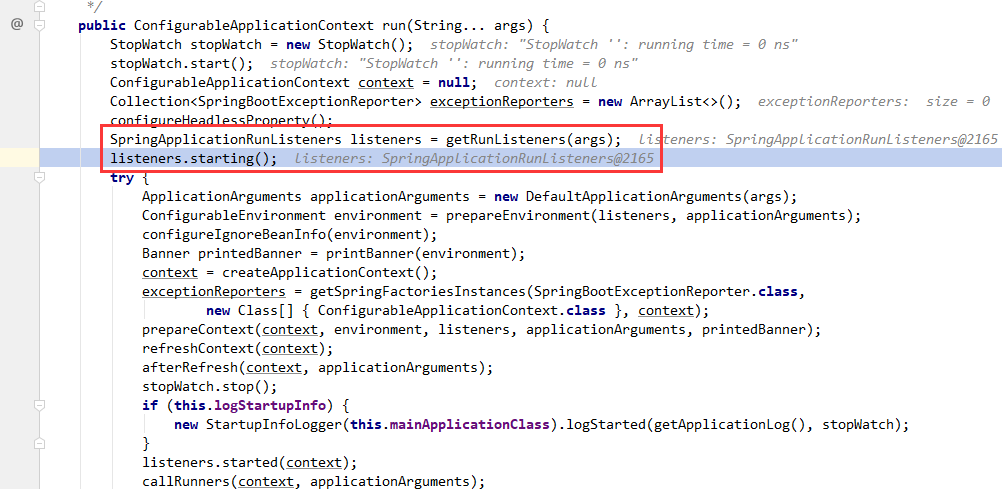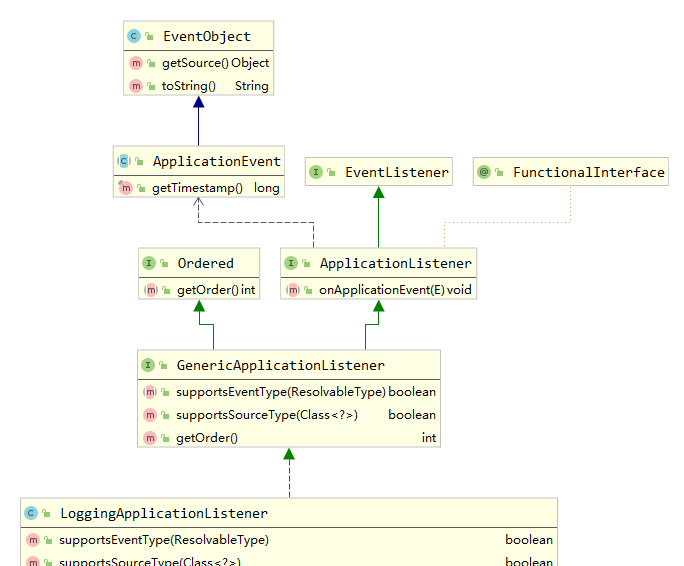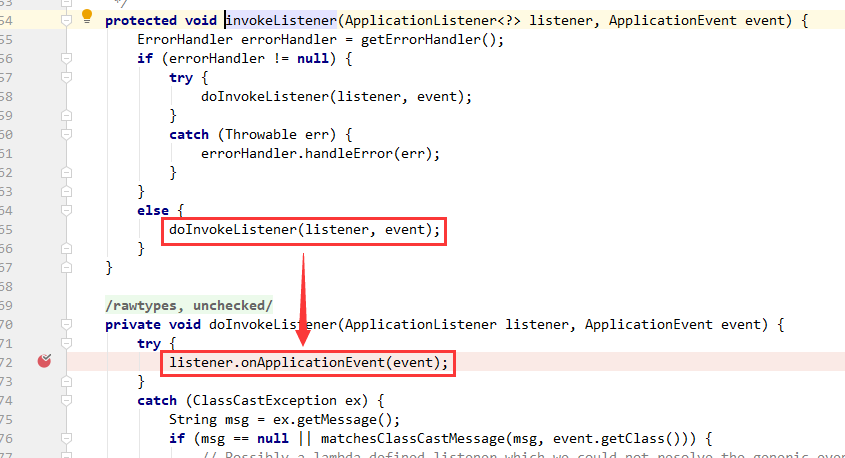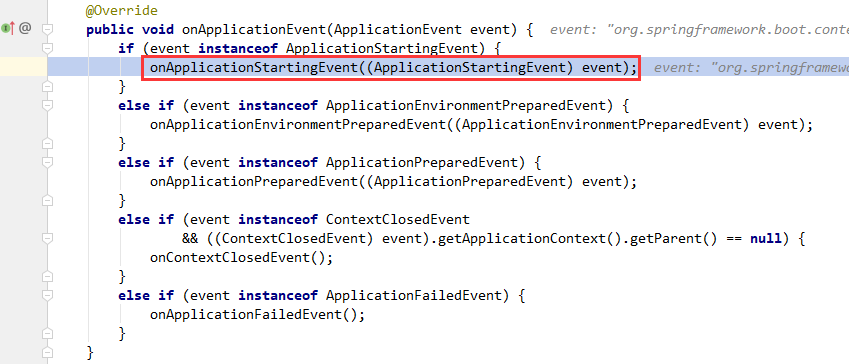SpringBoot使用的日志
SpringBoot使用的日志
1.执行过程
在SpringBoot启动过程中有这么两句话,点击查看详细启动过程

在listeners.starting();执行中  getApplicationListeners(event, type)这个方法会获得LoggingApplicationListeners、BackgroundPreinitializer、DelegationgApplicationListener、LiquibaseServiceLocatorApplicationListener 这4个Listener,其中LoggingApplicationListeners负责的就是
getApplicationListeners(event, type)这个方法会获得LoggingApplicationListeners、BackgroundPreinitializer、DelegationgApplicationListener、LiquibaseServiceLocatorApplicationListener 这4个Listener,其中LoggingApplicationListeners负责的就是
配置LoggingSystem的ApplicationListener 。 如果环境包含logging.config属性,它将用于引导日志系统,否则使用默认配置。 无论如何,如果环境包含logging.level.*条目,日志级别将被自定义,并且可以使用logging.group定义日志组。 当环境包含未设置为"false"的debug或trace属性时,将启用 Spring、Tomcat、Jetty 和 Hibernate 的调试和跟踪日志记录(即,如果您使用 java -jar myapp.jar [--debug | --trace])。 如果您喜欢忽略这些属性,您可以将parseArgs设置为false 。 默认情况下,日志输出仅写入控制台。 如果需要日志文件,可以使用logging.file.path和logging.file.name属性。 一些系统属性可能被设置为副作用,如果日志配置支持占位符(即 log4j 或 logback),这些可能很有用: LOG_FILE设置为应该写入的日志文件的路径值(如果有)。 如果可以确定,则将PID设置为当前进程 ID 的值。
类之间的关系很简单 
继承了ApplicationEvent,标志这个类是一个事件对象。这也就是为什么starting()方法为什么会调用到这个类的原因。 随后执行到 
因为事件对象的关系随后就执行到onApplicationEvent(ApplicationEvent event)方法 
进到onApplicationStartingEvent(ApplicationStartingEvent event)方法 
看下这个方法的详情this.loggingSystem = LoggingSystem.get(event.getSpringApplication().getClassLoader()); 这个方法在LoggingSystem这个类中
public static final String SYSTEM_PROPERTY = LoggingSystem.class.getName();
public static final String NONE = "none";
private static final Map<String, String> SYSTEMS;
static {
Map<String, String> systems = new LinkedHashMap<>();
systems.put("ch.qos.logback.core.Appender", "org.springframework.boot.logging.logback.LogbackLoggingSystem");
systems.put("org.apache.logging.log4j.core.impl.Log4jContextFactory",
"org.springframework.boot.logging.log4j2.Log4J2LoggingSystem");
systems.put("java.util.logging.LogManager", "org.springframework.boot.logging.java.JavaLoggingSystem");
SYSTEMS = Collections.unmodifiableMap(systems);
}
public static LoggingSystem get(ClassLoader classLoader) {
String loggingSystem = System.getProperty(SYSTEM_PROPERTY);
// 从系统配置取org.springframework.boot.logging.LoggingSystem是否为空
if (StringUtils.hasLength(loggingSystem)) {
// 判断loggingSystem是否是none字符
if (NONE.equals(loggingSystem)) {
return new NoOpLoggingSystem();
}
return get(classLoader, loggingSystem);
}
// 如果系统没有配置走这步,
// 过滤留下类名存在并且可以加载的元素
// 调用get初始化类得到第一个返回。没有报No suitable logging system located错误
return SYSTEMS.entrySet().stream().filter((entry) -> ClassUtils.isPresent(entry.getKey(), classLoader))
.map((entry) -> get(classLoader, entry.getValue())).findFirst()
.orElseThrow(() -> new IllegalStateException("No suitable logging system located"));
}
private static LoggingSystem get(ClassLoader classLoader, String loggingSystemClass) {
try {
Class<?> systemClass = ClassUtils.forName(loggingSystemClass, classLoader);
Constructor<?> constructor = systemClass.getDeclaredConstructor(ClassLoader.class);
constructor.setAccessible(true);
return (LoggingSystem) constructor.newInstance(classLoader);
}
catch (Exception ex) {
throw new IllegalStateException(ex);
}
}
我这里加载到的是Log4J2LoggingSystem类

this.loggingSystem.beforeInitialize();代码中注释是:将记录系统重置为限制输出。 该方法可以在initialize(LoggingInitializationContext, String, LogFile)之前调用,以减少日志噪音,直到系统完全初始化。 到这里就全部执行完成,其余都是return了。 。。。这到底是干了个啥。。。
2.看下LoggingApplicationListener的全部代码
最后让我来看下这个类LoggingApplicationListener,代码不多从头看
public class LoggingApplicationListener implements GenericApplicationListener {
// 返回logging.level的ConfigurationPropertyName
private static final ConfigurationPropertyName LOGGING_LEVEL = ConfigurationPropertyName.of("logging.level");
// 返回logging.group的ConfigurationPropertyName
private static final ConfigurationPropertyName LOGGING_GROUP = ConfigurationPropertyName.of("logging.group");
// 创建String键和LogLevel值类型的新Bindable Map
private static final Bindable<Map<String, LogLevel>> STRING_LOGLEVEL_MAP = Bindable.mapOf(String.class,
LogLevel.class);
private static final Bindable<Map<String, List<String>>> STRING_STRINGS_MAP = Bindable
.of(ResolvableType.forClassWithGenerics(MultiValueMap.class, String.class, String.class).asMap());
/**
* The default order for the LoggingApplicationListener.
* LoggingApplicationListener的默认顺序,整数最小值+20
*/
public static final int DEFAULT_ORDER = Ordered.HIGHEST_PRECEDENCE + 20;
/**
* The name of the Spring property that contains a reference to the logging
* configuration to load.
* Spring 属性的名称,其中包含对要加载的日志记录配置的引用。
*/
public static final String CONFIG_PROPERTY = "logging.config";
/**
* The name of the Spring property that controls the registration of a shutdown hook
* to shut down the logging system when the JVM exits.
* Spring 属性的名称,它控制注册关闭挂钩以在 JVM 退出时关闭日志记录系统
* @see LoggingSystem#getShutdownHandler
*/
public static final String REGISTER_SHUTDOWN_HOOK_PROPERTY = "logging.register-shutdown-hook";
/**
* The name of the {@link LoggingSystem} bean.
* LoggingSystem Bean 的名字
*/
public static final String LOGGING_SYSTEM_BEAN_NAME = "springBootLoggingSystem";
/**
* The name of the {@link LogFile} bean.
* LogFile bean 的名字
* @since 2.2.0
*/
public static final String LOG_FILE_BEAN_NAME = "springBootLogFile";
/**
* The name of the{@link LoggerGroups} bean.
* LoggerGroups bean 的名字
* @since 2.2.0
*/
public static final String LOGGER_GROUPS_BEAN_NAME = "springBootLoggerGroups";
private static final Map<String, List<String>> DEFAULT_GROUP_LOGGERS;
static {
// 初始化默认的日志组
MultiValueMap<String, String> loggers = new LinkedMultiValueMap<>();
loggers.add("web", "org.springframework.core.codec");
loggers.add("web", "org.springframework.http");
loggers.add("web", "org.springframework.web");
loggers.add("web", "org.springframework.boot.actuate.endpoint.web");
loggers.add("web", "org.springframework.boot.web.servlet.ServletContextInitializerBeans");
loggers.add("sql", "org.springframework.jdbc.core");
loggers.add("sql", "org.hibernate.SQL");
loggers.add("sql", "org.jooq.tools.LoggerListener");
DEFAULT_GROUP_LOGGERS = Collections.unmodifiableMap(loggers);
}
private static final Map<LogLevel, List<String>> SPRING_BOOT_LOGGING_LOGGERS;
static {
// 初始化默认的SPRING_BOOT_LOGGING_LOGGERS
MultiValueMap<LogLevel, String> loggers = new LinkedMultiValueMap<>();
loggers.add(LogLevel.DEBUG, "sql");
loggers.add(LogLevel.DEBUG, "web");
loggers.add(LogLevel.DEBUG, "org.springframework.boot");
loggers.add(LogLevel.TRACE, "org.springframework");
loggers.add(LogLevel.TRACE, "org.apache.tomcat");
loggers.add(LogLevel.TRACE, "org.apache.catalina");
loggers.add(LogLevel.TRACE, "org.eclipse.jetty");
loggers.add(LogLevel.TRACE, "org.hibernate.tool.hbm2ddl");
SPRING_BOOT_LOGGING_LOGGERS = Collections.unmodifiableMap(loggers);
}
private static final Class<?>[] EVENT_TYPES = { ApplicationStartingEvent.class,
ApplicationEnvironmentPreparedEvent.class, ApplicationPreparedEvent.class, ContextClosedEvent.class,
ApplicationFailedEvent.class };
private static final Class<?>[] SOURCE_TYPES = { SpringApplication.class, ApplicationContext.class };
private static final AtomicBoolean shutdownHookRegistered = new AtomicBoolean(false);
private final Log logger = LogFactory.getLog(getClass());
// 使用的日志系统,在onApplicationStartingEvent()方法中赋值
private LoggingSystem loggingSystem;
private LogFile logFile;
private LoggerGroups loggerGroups;
private int order = DEFAULT_ORDER;
private boolean parseArgs = true;
private LogLevel springBootLogging = null;
@Override
public boolean supportsEventType(ResolvableType resolvableType) {
return isAssignableFrom(resolvableType.getRawClass(), EVENT_TYPES);
}
@Override
public boolean supportsSourceType(Class<?> sourceType) {
return isAssignableFrom(sourceType, SOURCE_TYPES);
}
private boolean isAssignableFrom(Class<?> type, Class<?>... supportedTypes) {
if (type != null) {
for (Class<?> supportedType : supportedTypes) {
if (supportedType.isAssignableFrom(type)) {
return true;
}
}
}
return false;
}
@Override
public void onApplicationEvent(ApplicationEvent event) {
if (event instanceof ApplicationStartingEvent) {
// listeners.starting();中的第一个Listener会执行到这个方法
onApplicationStartingEvent((ApplicationStartingEvent) event);
}
else if (event instanceof ApplicationEnvironmentPreparedEvent) {
onApplicationEnvironmentPreparedEvent((ApplicationEnvironmentPreparedEvent) event);
}
else if (event instanceof ApplicationPreparedEvent) {
onApplicationPreparedEvent((ApplicationPreparedEvent) event);
}
else if (event instanceof ContextClosedEvent
&& ((ContextClosedEvent) event).getApplicationContext().getParent() == null) {
onContextClosedEvent();
}
else if (event instanceof ApplicationFailedEvent) {
onApplicationFailedEvent();
}
}
private void onApplicationStartingEvent(ApplicationStartingEvent event) {
// 根据类加载器获取不同的日志系统。详情看下面详细介绍
this.loggingSystem = LoggingSystem.get(event.getSpringApplication().getClassLoader());
this.loggingSystem.beforeInitialize();
}
private void onApplicationEnvironmentPreparedEvent(ApplicationEnvironmentPreparedEvent event) {
if (this.loggingSystem == null) {
this.loggingSystem = LoggingSystem.get(event.getSpringApplication().getClassLoader());
}
initialize(event.getEnvironment(), event.getSpringApplication().getClassLoader());
}
private void onApplicationPreparedEvent(ApplicationPreparedEvent event) {
ConfigurableListableBeanFactory beanFactory = event.getApplicationContext().getBeanFactory();
if (!beanFactory.containsBean(LOGGING_SYSTEM_BEAN_NAME)) {
beanFactory.registerSingleton(LOGGING_SYSTEM_BEAN_NAME, this.loggingSystem);
}
if (this.logFile != null && !beanFactory.containsBean(LOG_FILE_BEAN_NAME)) {
beanFactory.registerSingleton(LOG_FILE_BEAN_NAME, this.logFile);
}
if (this.loggerGroups != null && !beanFactory.containsBean(LOGGER_GROUPS_BEAN_NAME)) {
beanFactory.registerSingleton(LOGGER_GROUPS_BEAN_NAME, this.loggerGroups);
}
}
private void onContextClosedEvent() {
if (this.loggingSystem != null) {
this.loggingSystem.cleanUp();
}
}
private void onApplicationFailedEvent() {
if (this.loggingSystem != null) {
this.loggingSystem.cleanUp();
}
}
/**
* Initialize the logging system according to preferences expressed through the
* {@link Environment} and the classpath.
* @param environment the environment
* @param classLoader the classloader
*/
protected void initialize(ConfigurableEnvironment environment, ClassLoader classLoader) {
new LoggingSystemProperties(environment).apply();
this.logFile = LogFile.get(environment);
if (this.logFile != null) {
this.logFile.applyToSystemProperties();
}
this.loggerGroups = new LoggerGroups(DEFAULT_GROUP_LOGGERS);
initializeEarlyLoggingLevel(environment);
initializeSystem(environment, this.loggingSystem, this.logFile);
initializeFinalLoggingLevels(environment, this.loggingSystem);
registerShutdownHookIfNecessary(environment, this.loggingSystem);
}
private void initializeEarlyLoggingLevel(ConfigurableEnvironment environment) {
if (this.parseArgs && this.springBootLogging == null) {
if (isSet(environment, "debug")) {
this.springBootLogging = LogLevel.DEBUG;
}
if (isSet(environment, "trace")) {
this.springBootLogging = LogLevel.TRACE;
}
}
}
private boolean isSet(ConfigurableEnvironment environment, String property) {
String value = environment.getProperty(property);
return (value != null && !value.equals("false"));
}
private void initializeSystem(ConfigurableEnvironment environment, LoggingSystem system, LogFile logFile) {
LoggingInitializationContext initializationContext = new LoggingInitializationContext(environment);
String logConfig = environment.getProperty(CONFIG_PROPERTY);
if (ignoreLogConfig(logConfig)) {
system.initialize(initializationContext, null, logFile);
}
else {
try {
ResourceUtils.getURL(logConfig).openStream().close();
system.initialize(initializationContext, logConfig, logFile);
}
catch (Exception ex) {
// NOTE: We can't use the logger here to report the problem
System.err.println("Logging system failed to initialize using configuration from '" + logConfig + "'");
ex.printStackTrace(System.err);
throw new IllegalStateException(ex);
}
}
}
private boolean ignoreLogConfig(String logConfig) {
return !StringUtils.hasLength(logConfig) || logConfig.startsWith("-D");
}
private void initializeFinalLoggingLevels(ConfigurableEnvironment environment, LoggingSystem system) {
bindLoggerGroups(environment);
if (this.springBootLogging != null) {
initializeSpringBootLogging(system, this.springBootLogging);
}
setLogLevels(system, environment);
}
private void bindLoggerGroups(ConfigurableEnvironment environment) {
if (this.loggerGroups != null) {
Binder binder = Binder.get(environment);
binder.bind(LOGGING_GROUP, STRING_STRINGS_MAP).ifBound(this.loggerGroups::putAll);
}
}
/**
* Initialize loggers based on the {@link #setSpringBootLogging(LogLevel)
* springBootLogging} setting. By default this implementation will pick an appropriate
* set of loggers to configure based on the level.
* @param system the logging system
* @param springBootLogging the spring boot logging level requested
* @since 2.2.0
*/
protected void initializeSpringBootLogging(LoggingSystem system, LogLevel springBootLogging) {
BiConsumer<String, LogLevel> configurer = getLogLevelConfigurer(system);
SPRING_BOOT_LOGGING_LOGGERS.getOrDefault(springBootLogging, Collections.emptyList())
.forEach((name) -> configureLogLevel(name, springBootLogging, configurer));
}
/**
* Set logging levels based on relevant {@link Environment} properties.
* @param system the logging system
* @param environment the environment
* @since 2.2.0
*/
protected void setLogLevels(LoggingSystem system, ConfigurableEnvironment environment) {
BiConsumer<String, LogLevel> customizer = getLogLevelConfigurer(system);
Binder binder = Binder.get(environment);
Map<String, LogLevel> levels = binder.bind(LOGGING_LEVEL, STRING_LOGLEVEL_MAP).orElseGet(Collections::emptyMap);
levels.forEach((name, level) -> configureLogLevel(name, level, customizer));
}
private void configureLogLevel(String name, LogLevel level, BiConsumer<String, LogLevel> configurer) {
if (this.loggerGroups != null) {
LoggerGroup group = this.loggerGroups.get(name);
if (group != null && group.hasMembers()) {
group.configureLogLevel(level, configurer);
return;
}
}
configurer.accept(name, level);
}
private BiConsumer<String, LogLevel> getLogLevelConfigurer(LoggingSystem system) {
return (name, level) -> {
try {
name = name.equalsIgnoreCase(LoggingSystem.ROOT_LOGGER_NAME) ? null : name;
system.setLogLevel(name, level);
}
catch (RuntimeException ex) {
this.logger.error(LogMessage.format("Cannot set level '%s' for '%s'", level, name));
}
};
}
private void registerShutdownHookIfNecessary(Environment environment, LoggingSystem loggingSystem) {
boolean registerShutdownHook = environment.getProperty(REGISTER_SHUTDOWN_HOOK_PROPERTY, Boolean.class, false);
if (registerShutdownHook) {
Runnable shutdownHandler = loggingSystem.getShutdownHandler();
if (shutdownHandler != null && shutdownHookRegistered.compareAndSet(false, true)) {
registerShutdownHook(new Thread(shutdownHandler));
}
}
}
void registerShutdownHook(Thread shutdownHook) {
Runtime.getRuntime().addShutdownHook(shutdownHook);
}
public void setOrder(int order) {
this.order = order;
}
@Override
public int getOrder() {
return this.order;
}
/**
* Sets a custom logging level to be used for Spring Boot and related libraries.
* @param springBootLogging the logging level
*/
public void setSpringBootLogging(LogLevel springBootLogging) {
this.springBootLogging = springBootLogging;
}
/**
* Sets if initialization arguments should be parsed for {@literal debug} and
* {@literal trace} properties (usually defined from {@literal --debug} or
* {@literal --trace} command line args). Defaults to {@code true}.
* @param parseArgs if arguments should be parsed
*/
public void setParseArgs(boolean parseArgs) {
this.parseArgs = parseArgs;
}
}